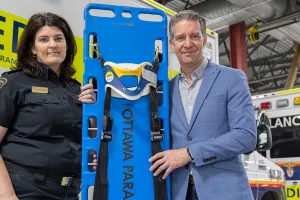Healthcare crises affect how survivors of sexual assault seek help
 " We found a significant increase in rates of ED encounters for sexual assault in the two months leading up to the pandemic, potentially due to increasing stress in society. There was a sharp drop immediately following March 2020, and fluctuating rates with each new wave." - Dr. Katherine MuldoonPandemic restrictions were associated with reduced rates of emergency department visits for sexual assault, signaling the need for trauma and violence-informed measures during healthcare crises, according to a new study using ICES data.
" We found a significant increase in rates of ED encounters for sexual assault in the two months leading up to the pandemic, potentially due to increasing stress in society. There was a sharp drop immediately following March 2020, and fluctuating rates with each new wave." - Dr. Katherine MuldoonPandemic restrictions were associated with reduced rates of emergency department visits for sexual assault, signaling the need for trauma and violence-informed measures during healthcare crises, according to a new study using ICES data.
Prior research showed a decrease in emergency department (ED) visits for violence and sexual assault in the early months of the COVID-19 pandemic, but less is known about health care encounters for sexual assault throughout the ongoing waves of the pandemic.
"We explored the trends in ED encounters for sexual assault, in the years and months leading up to the pandemic and throughout the four waves of COVID-19 restrictions," says lead author Dr. Katherine Muldoon, assistant professor at the University of Ottawa, senior research associate at The Ottawa Hospital, and collaborating researcher at ICES. "Unexpectedly, we found a significant increase in rates of ED encounters for sexual assault in the two months leading up to the pandemic, potentially due to increasing stress in society. There was a sharp drop immediately following March 2020, and fluctuating rates with each new wave."
The study, published in JAMA Network Open, used administrative health data to track annual patterns of ED encounters for sexual assault in Ontario, Canada, from January 11, 2019, to September 10, 2021. Within that period there were 10,523 sexual assault cases, with 88 percent among female individuals.
 "The goal of trauma and violence-informed care is to minimize harm while providing the best possible care for survivors of sexual violence. This approach should be applied when developing healthcare policies, especially during emergencies or disruptions to services." -Dr. Kari SampselThe data showed that:
"The goal of trauma and violence-informed care is to minimize harm while providing the best possible care for survivors of sexual violence. This approach should be applied when developing healthcare policies, especially during emergencies or disruptions to services." -Dr. Kari SampselThe data showed that:
- ED encounters for sexual assault increased 20 to 25 percent just prior to lockdown measures. This pattern was similar across sex, age group, community size, and income levels.
- Following the first lockdown, cases dropped 50 to 60 percent and stayed below typical levels during the next four waves of COVID-19.
- There was a seasonal pattern of increasing ED visits during the summer months, which coincided with fewer COVID-19 infections and a loosening of pandemic restrictions.
Importantly, ED encounters only represent a fraction of sexual assaults that occur in the general population, as survivors may not seek care at all, may seek help from community-based services or other non-hospital settings. Lack of visible injuries may also discourage someone from visiting the ED, even though EDs can help survivors of all forms of gender-based violence receive the specialized care they need.
These findings show that healthcare crises affect how survivors access urgent care, and this could have long-term clinical, social, and legal consequences. Specialized and trauma-informed clinics are the best solution for encouraging survivors to come to EDs following a sexual assault, according to treatment guidelines from the Ontario Network of Sexual Assault and Domestic Violence Treatment Centres, but many hospitals do not have them. This also increases the stressors facing EDs that are already struggling as the safety net of the healthcare system.
"Survivors of sexual violence need a variety of medical, psychosocial supports and protection to help them heal in the aftermath of such experiences," says Heidi Illingworth, Executive Director of Ottawa Victim Services, a community-based agency that provides emotional support, referrals and assistance to individuals who have been victimized. "Access to urgent healthcare is especially important in some cases. Without improved public education and outreach efforts during restrictions or disruptions in hospital services, survivors may face negative outcomes. Connecting survivors to victim services provides critical support in their healing and recovery."
"The goal of trauma and violence-informed care is to minimize harm while providing the best possible care for survivors of sexual violence," said Dr. Kari Sampsel, emergency physician and Medical Director of The Ottawa Hospital Sexual Assault and Partner Abuse Care Program and assistant professor at the University of Ottawa. "This approach should be applied when developing healthcare policies, especially during emergencies or disruptions to services."
The study, "Population-level trends in emergency department encounters for sexual assault preceding and during the COVID-19 pandemic across Ontario, Canada" was published in JAMA Network Open on Dec 29, 2022.
Author block: Muldoon KA; Talarico R, Fell DB, Illingworth H, Sampsel K, Manuel DG.
*If you or a loved one has been affected by sexual violence, resources can be found here. To find a sexual assault centre near you, follow this link.*
The Ottawa Hospital Sexual Assault and Partner Abuse Care Program is available 24/7 at The Ottawa Hospital Civic Campus Emergency Department to work with patients who have been the victim of gender-based violence, and help them receive the specialized care they need.
ICES is an independent, non-profit research institute that uses population-based health information to produce knowledge on a broad range of health care issues. Our unbiased evidence provides measures of health system performance, a clearer understanding of the shifting health care needs of Ontarians, and a stimulus for discussion of practical solutions to optimize scarce resources. ICES knowledge is highly regarded in Canada and abroad, and is widely used by government, hospitals, planners, and practitioners to make decisions about care delivery and to develop policy. In October 2018, the institute formerly known as the Institute for Clinical Evaluative Sciences formally adopted the initialism ICES as its official name. For the latest ICES news, follow us on Twitter: @ICESOntario
About The Ottawa Hospital
The Ottawa Hospital is one of Canada's top learning and research hospitals, where excellent care is inspired by research and driven by compassion. As the third-largest employer in Ottawa, our support staff, researchers, nurses, physicians, and volunteers never stop seeking solutions to the most complex health-care challenges. Our multi-campus hospital, affiliated with the University of Ottawa, attracts some of the most influential scientific minds from around the world. Backed by generous support from the community, we are committed to providing the world-class, compassionate care we would want for our loved ones. www.ohri.ca
About the University of Ottawa
The University of Ottawa is home to over 50,000 students, faculty and staff, who live, work and study in both French and English. Our campus is a crossroads of cultures and ideas, where bold minds come together to inspire game-changing ideas. We are one of Canada's top 10 research universities--our professors and researchers explore new approaches to today's challenges. One of a handful of Canadian universities ranked among the top 200 in the world, we attract exceptional thinkers and welcome diverse perspectives from across the globe. www.uottawa.ca
About Ottawa Victim Services
Ottawa Victim Services (OVS) provides emotional support, practical assistance, referrals and advocacy to individuals who have been victimized as a result of a crime or tragic circumstance, without judgment in order to lessen the impact of victimization. OVS is a community-based agency committed to treating individuals with courtesy, compassion and with respect for their dignity, privacy and diversity.
Media contacts:
Misty Pratt
Senior Communications Officer, ICES
Misty.Pratt@ices.on.ca 613-882-7065
Amelia Buchanan
Senior Communication Specialist, Ottawa Hospital Research Institute
ambuchanan@ohri.ca 613-297-8315
Learn more about:
The Ottawa Hospital is a leading academic health, research and learning hospital proudly affiliated with the University of Ottawa and supported by The Ottawa Hospital Foundation.


